
Early Signs of Inflammatory Breast Cancer
Regional Cancer Care Associates (RCCA) provides comprehensive treatment of cancer and blood disorders to patients throughout New Jersey, Connecticut, Maryland, and the Washington, DC, area.
HIPAA Alert: Potential Data Breach Learn More
Questions on Oncology, Hematology and/or Infusion Clinical Services due to COVID-19 Crisis – CALL 833-698-1623
Important Information for Our Patients Regarding the Coronavirus.
RCCA Providing Area Cancer Patients with Access to Care During Coronavirus Outbreak
RCCA Offering Patients Virtual Visits During Coronavirus Pandemic
Breast cancer rates are rising across the nation and in Connecticut, with the American Cancer Society estimating that 3,620 women in the state will be diagnosed with the disease this year.1
The medical oncologists practicing in the West Hartford and Manchester offices of Regional Cancer Care Associates (RCCA), one of the nation’s largest networks of cancer specialists, have seen that disturbing trend firsthand.
What they have also seen, however, is how a parallel trend of increasingly effective and sophisticated treatment regimens is enabling them to achieve outcomes unimaginable even a few years ago.
“The incidence of breast cancer has been going up for the past 20 years, but survival rates have increased to an even greater extent during that period,” says Charanjeev Kapoor, MD, a board-certified medical oncologist and hematologist who treats patients at RCCA’s Manchester office. Dr. Kapoor notes that the overall 5-year relative survival rate for breast cancer is 91%, while the rate for women with localized breast cancer – the stage at which most cases are diagnosed – is 99%.2
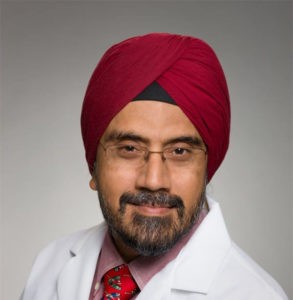
Joel Silver, MD, a board-certified medical oncologist and hematologist who practices at RCCA’s West Hartford office, says those gains in survival are driven in large measure by the availability of a wide array of therapies, which enables physicians to individualize a woman’s treatment to optimal effect. “We now have the ability to develop treatment plans that take into account everything from the genetics and hormone-receptor status of a tumor to a woman’s overall health and any other health issues she may have,” Dr. Silver says.
He adds, “The advances we’ve made in treating breast cancer encompass surgical techniques, radiation therapy regimens, and medical treatments such as chemotherapy, targeted therapy, immunotherapy, and the hormonal medications we prescribe to reduce the chances of cancer recurring. Beyond having more treatment choices, we also have better approaches than ever before for avoiding or managing the side effects of therapy.”
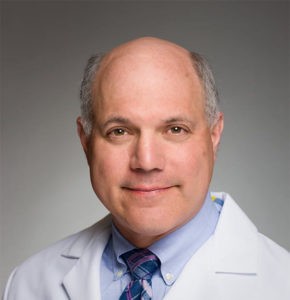
Mohammad Pazooki, MD, a board-certified medical oncologist and hematologist who practices at RCCA’s West Hartford and Manchester offices, adds that the dramatic progress made in treating breast cancer has been accompanied by a less-noticed but equally important development – the availability of comprehensive, cutting-edge care in the community setting.
“There was a time many years ago when the newest approaches to treating breast cancer and other malignancies ‘debuted,’ if you will, at major academic medical centers and then slowly made their way to community-based centers – which is where more than 80% of all cancer care is provided,” Dr. Pazooki says. He continues,
“Happily, those days are long gone. Here at RCCA, for example, we offer therapies as soon as they win FDA approval. Further, because we have a very active clinical trials program, our patients also have access to the latest investigational approaches being evaluated in breast cancer. Along with our use of sophisticated assessments of tumor genetics and a wide range of support services, we’re able to provide patients with comprehensive care in a convenient setting near their homes.”
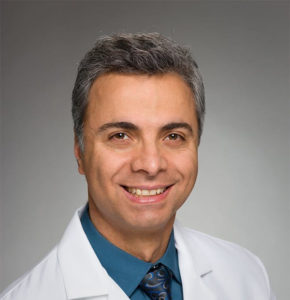
Breast cancer diagnoses: Recent trends in Connecticut
| Location | Age-adjusted incidence rate – cases per 100,000 persons | Average annual count, 2015-2019 | Recent 5-year trend |
| United States | 128.1 | 253,845 | Rising |
| Connecticut | 141.1 | 3,326 | Rising |
| Fairfield County | 148.1 | 886 | Stable |
| Hartford County | 141.8 | 840 | Rising |
| Litchfield County | 147.6 | 197 | Stable |
| Middlesex County | 147.0 | 176 | Stable |
| New Haven County | 138.2 | 789 | Stable |
| New London County | 126.4 | 224 | Stable |
| Tolland County | 140.2 | 126 | Stable |
| Windham County | 112.9 | 87 | Stable |
Source: National Cancer Institute and U.S. Centers for Disease Control and Prevention – State Cancer Profiles. http://statecancerprofiles.cancer.gov/data-topics/incidence.html.
What’s driving rising breast cancer rates?
While the enhanced ability to treat breast cancer is reassuring, understanding what is behind the increased incidence of the disease – and what steps women can take to protect their health – remains critical.
Michael Reale, MD, provides some perspective and guidance on those topics. Dr. Reale, a board-certified medical oncologist and hematologist who practices at RCCA’s Manchester office, notes that the annual, age-adjusted rate of breast cancer diagnoses in Connecticut is 141.1 per 100,000 adults – well above the national average of 128.1/100,000.3 Incidence rates in Connecticut range from 112.9/100,000 in Windham County to 148.1 in Fairfield County.3 (See accompanying table, “Breast cancer diagnoses: Recent trends in Connecticut”)
He adds that many factors play a role in determining a woman’s risk for breast cancer, including:
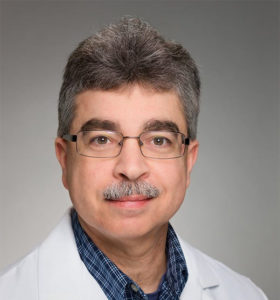
“While many of these factors are beyond a woman’s control – such as age and family history – others can be modified to reduce risk,” says Dr. Reale, noting the importance of maintaining a healthy weight, being physically active, and either not drinking alcohol or drinking only in moderation.
Further, he notes, it is important for women to have mammograms at regular intervals because prompt detection of breast cancer allows for treatment in the earliest stages of the disease, when the likelihood of successful outcomes is highest.
He adds, “In May 2023, the United States Preventive Services Task Force (USPSTF), an independent, volunteer panel of experts in disease prevention, released a draft recommendation that women at average risk for breast cancer should begin having mammograms at age 40.4 Previously, the USPSTF said that women at average risk should not start screening until age 50, and that decisions about screening women in their 40’s should be made on an individual basis. Given the increasing incidence of breast cancer, I support this recommendation and urge all women to begin having mammograms at the age appropriate for their risk status, to continue having mammograms at the specified intervals, and to be alert to any changes in their breasts that may warrant medical evaluation.”
Dr. Kapoor says, “While the rising number of breast cancer diagnoses is troubling, women should know that there are steps they can take to reduce their risk, that early detection can make a big difference, and that if they should ever have to face breast cancer, there is abundant cause for hope. My RCCA colleagues and I take care of hundreds of women with breast cancer each year, and while we hope you will never require our services, we are here for you if needed and proud to offer excellent care close to our patients’ homes.”
++++++++++++
Drs. Kapoor, Silver, Pazooki, and Reale are among the 90+ cancer specialists who treat patients at more than 20 RCCA care centers located throughout New Jersey, Connecticut, Maryland, and the Washington, DC, area. RCCA oncologists and hematologists see more than 23,000 new patients each year and provide care to more than 225,000 established patients.
RCCA offers the latest evidence-based treatments for breast cancer that are precisely tailored to each patient’s particular cancer. These treatments include:
RCCA also offers opportunities for patients to participate in clinical trials of potentially beneficial investigational agents. RCCA has access to some 300 trials throughout its network.
In addition to serving patients who have solid tumors, blood-based cancers, and benign blood disorders such as anemia, RCCA care centers also provide infusion services to people with non-oncologic conditions—including multiple sclerosis, Crohn’s disease, asthma, iron-deficiency anemia, and rheumatoid arthritis—who take intravenously-administered medications.
To learn more about RCCA, call 1-844-346-7222 or visit RCCA.com.
References
Breast cancer diagnoses: Recent trends in Connecticut
| Location | Age-adjusted incidence rate – cases per 100,000 persons | Average annual count, 2015-2019 | Recent 5-year trend |
| United States | 128.1 | 253,845 | Rising |
| Connecticut | 141.1 | 3,326 | Rising |
| Fairfield County | 148.1 | 886 | Stable |
| Hartford County | 141.8 | 840 | Rising |
| Litchfield County | 147.6 | 197 | Stable |
| Middlesex County | 147.0 | 176 | Stable |
| New Haven County | 138.2 | 789 | Stable |
| New London County | 126.4 | 224 | Stable |
| Tolland County | 140.2 | 126 | Stable |
| Windham County | 112.9 | 87 | Stable |
Source: National Cancer Institute and U.S. Centers for Disease Control and Prevention – State Cancer Profiles. http://statecancerprofiles.cancer.gov/data-topics/incidence.html.
For more information or to schedule an appointment,
call 844-346-7222. You can also schedule an appointment by calling the RCCA location nearest you.

Regional Cancer Care Associates (RCCA) provides comprehensive treatment of cancer and blood disorders to patients throughout New Jersey, Connecticut, Maryland, and the Washington, DC, area.

When people think of breast cancer, they generally think of it affecting women. However, in rare circumstances, breast cancer can affect men, most commonly in
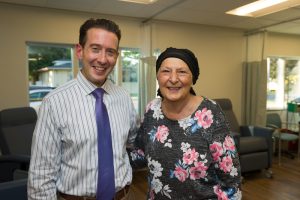
First diagnosed with breast cancer in 1992, she has persevered in her battle against the disease for more than 30 years.

Regional Cancer Care Associates is one of fewer than 200 medical practices in the country selected to participate in the Oncology Care Model (OCM); a recent Medicare initiative aimed at improving care coordination and access to and quality of care for Medicare beneficiaries undergoing chemotherapy treatment.